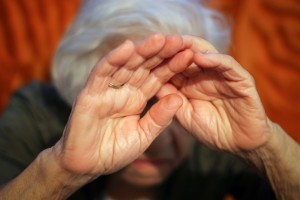Signs of Elder Abuse and How to Help

We’ve all seen the horror stories on the news about elder abuse, with people sneaking hidden cameras into care facilities and catching care aids abusing patients. Elder abuse is, unfortunately, more common than you might think and occurs not only in care facilities, but in private homes as well.
What is elder abuse?
As people age, they become more physically frail and less able to stand up to bullying or fight back. Ailments might make seniors more difficult to live with, more taxing on the nerves, causing those around them to lash out in frustration.
Even if there is no physical abuse, waning sight, memory, and hearing allow for seniors to be more easily taken advantage of. Whenever an elderly person is being mistreated, regardless of severity, this constitutes elder abuse.
In the U.S., more than half a million reports of abuse are recorded each year, but many more than that never reach authorities.
At first, signs of abuse may appear to be symptoms of dementia, Alzheimer’s, or simply the natural results of frailty that comes with age; caregivers will often explain signs away by pinning them onto these things. Many of the signs and symptoms do overlap with the symptoms of mental and physical degeneration, but that doesn’t warrant an outright dismissal of a senior’s claims of abuse.
Also, people are sometimes hesitant to talk openly about abuse if it is coming from a loved one. If you notice something strange happening to a neighbor or even someone closer to you, like bruises or uncalled for cautiousness around you, it is important to notify authorities.
Some general signs of abuse:
- Consistent arguments between caregivers and the patient, whether they are professional caregivers or family members.
- Changes in a senior’s disposition or behavior.
- Mysterious injuries such as bruises, welts, cuts, or scars.
- Broken bones, dislocations, and sprains that cannot be explained.
- Mismanagement of medication or overdose of medication.
- A caregiver’s refusal to let you see the patient alone.
- Interference with ADLs
How to alert authorities:
Frustratingly, seniors do have the right to refuse aid unless they are unable to make decisions for themselves so even if you do report signs of abuse, there may be no way to help. Even more disheartening, some seniors may view an abusive caretaker as better than no caretaker at all.
In a situation like this, it is important to stay supportive and tell the senior they have other alternatives.
When reporting abuse, you don’t necessarily need “hard evidence” and in many situations, the signs of abuse are gradual with very subtle changes. The agency to call if you suspect elder abuse is called Adult Protective Services. Even if you don’t think it’s helping or the elder refuses help, each reported instance creates a record of what is going on. The more information provided, the better the chance you can get through to the senior and get him or her the care they need.
Elder abuse is so prevalent because older people can become very isolated from the rest of their community. With no work obligations, familial obligation, or school obligations, it becomes more difficult to recognize the subtle changes that daily contact can provide. Periodically checking in helps more than you know. Plus, even if there is no abuse, the check-ins are sure to brighten your elderly community members’ day.
Max Gottlieb works with Senior Planning in Phoenix, Arizona. Senior Planning gives free assistance to seniors and their families, finding senior care that is most suitable for their situation.

